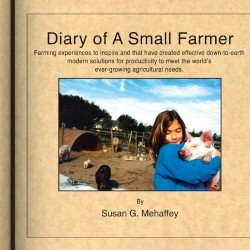Diary of a Small Farmer
The small farmer in America is a dying breed and Susan Mehaffey’s short memoir may provide some clues as to why this is true. After losing her position as a registered nurse Mehaffey purchased four and a half acres of land in Florida. She intended to raise horses but ended up starting a small farm with her family instead. Mehaffey admits in the book’s introduction that farming “does not seem profitable no matter how long you work at it.”
Despite this realization Mehaffey is proud of what she accomplished during her years of farming (she eventually sold her farm) and rightly so. She was clearly an enlightened and responsible farmer with an interest in raising free-range farm animals and practicing organic growing techniques.
In her diary Mehaffey covers four types of animal husbandry and organic horticulture. Each chapter is a very brief and somewhat disjointed discussion that combines the author’s specific experiences with her observations about farming. The reader gets an inside look at some of the trials and tribulations of being a small farmer but it comes at the price of navigating some pretty rocky writing. The diary isn’t for the squeamish; Mehaffey with her medical background is not shy about describing in detail the underbelly of farm animal care.
The most interesting aspect of Diary of a Small Farmer may be the fact that Mehaffey shares her ideas about recycling and more intriguingly about the use of the sea as a burial ground. Mehaffey proposes some unique solutions such as “swill collection centers” located in restaurants and school cafeterias for table scrap recycling. She points out that this would create jobs on a global scale as well as provide a food source for farmers raising hogs.
Mehaffey also discusses a different type of recycling—what happens to humans and animals when they die. “Perhaps our greatest engineer God did have corpse and carcass seaburials in mind when He designed and built massive oceans with scavengers on the bottom and sharks with their powerful jaws and sharp teeth” she writes. In addition to pondering sea burial the author wonders about a time when humans may live in and on the sea. While this is not an original idea it is deserving of consideration.
Readers will glean some useful tips and techniques that could be applied to running a farm but reading Mehaffey’s diary may serve to discourage rather than encourage a person from becoming a small farmer. Nevertheless Mehaffey is to be admired for her stint as a farmer and for her ability to think outside the box when it comes to environmentally responsible methods for protecting our planet.
Reviewed by
Barry Silverstein
Disclosure: This article is not an endorsement, but a review. The publisher of this book provided free copies of the book and paid a small fee to have their book reviewed by a professional reviewer. Foreword Reviews and Clarion Reviews make no guarantee that the publisher will receive a positive review. Foreword Magazine, Inc. is disclosing this in accordance with the Federal Trade Commission’s 16 CFR, Part 255.

